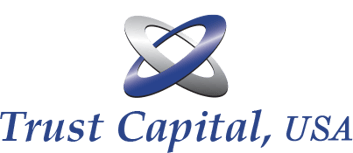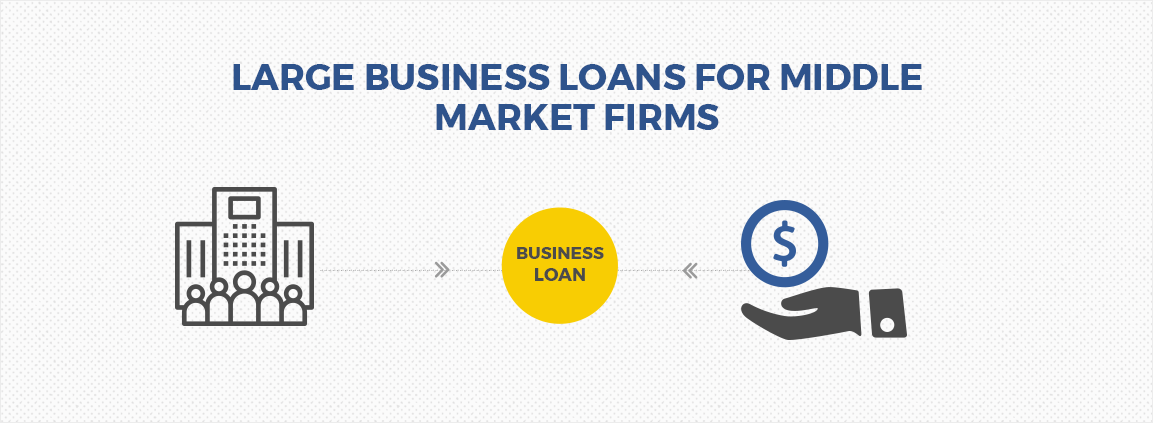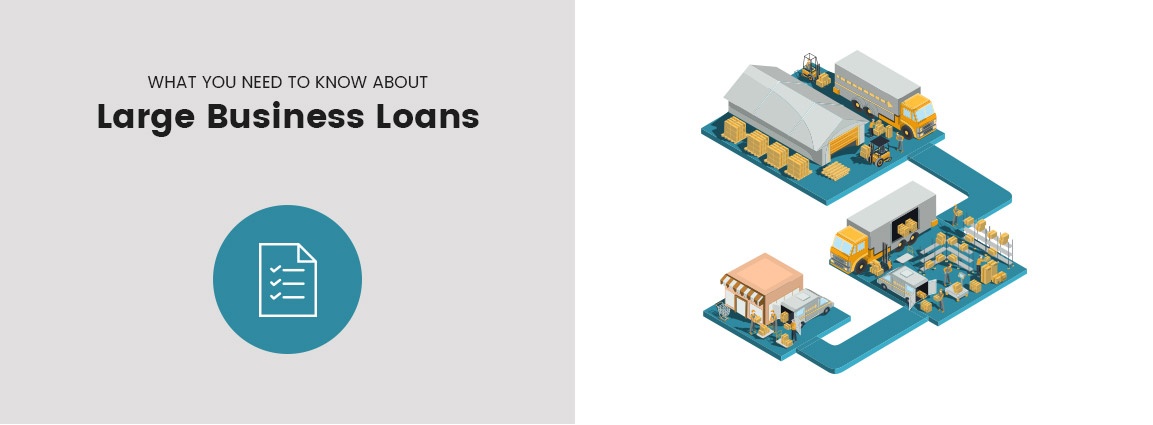Thinking about getting large business loans for your company?
Large business loans help businesses keep up with daily operations or even make expansions by providing them with necessary funds. Once the money has been lent, payments are made on a monthly basis over an agreed loan term. Typically around 60 months but they could go up to 120 months if you got into an SBA loan
However, qualifying for a loan became difficult for most businesses. With the credit crunch that began in 2007-08, banks became stricter in terms of commercial lending standards.
The only solution is for middle market companies to search for other sources of capital for their businesses. That’s why today we’ll discuss these other options to get large business loans for middle market companies.
Gaining Access to Large Business Loans for Middle Market Firms
Businesses take out large business loans if their reserves are insufficient. But this proved difficult as banks began demanding more collateral and higher interest rates.
Thankfully, there are other non-traditional resources that can provide businesses their needed large business loans.
But before we talk more about these, let’s first understand why there is a need for this among middle market companies.

Getting a Large Business Loan for Middle Market Companies
Middle market companies are are larger than small businesses, but smaller than big businesses. Each of these companies has an annual revenue of between $100 million and $3 billion, accounting for the middle third of the US economy’s revenue.
A middle-market company seek large business loans for various reasons. Typical uses of loans for middle market companies include business expansion, increasing manpower, and purchase of major equipment such as titled vehicles and heavy machinery.
So how do these middle market companies get these large business loans to acquire their equipment?
Equipment Financing Options for Middle Market Firms
Since the sudden reduction in the availability of funds in the credit market, banks became strict with their lending standards. Not only made this more difficult to obtain a credit, but interest rates subsequently increased.
With that, middle market firms turned to non-bank sources of financial capital for purchasing equipment. These private equipment finance companies allow middle market companies to grow and get their equipment purchases off the ground.
Factoring
Factoring is a traditional form of non-bank finance and is commonly used by retail and trucking companies. Here, an account is transferred to a third party known as the factor in exchange for cash.
This traditional form of nonbank finance provides cash flow to the company by receiving approximately 80% of the account value. This can vary depending on the agreement and payment history of the customer.
Sale-Leaseback Financing
In sale-leaseback financing for middle market company equipment, an asset is sold back to an equipment leasing company and immediately leases it back to the lessee. Middle market companies will do this to inject working capital back into their business. We've had companies do this in order for one owner to buy out the other owner in the business as well.
Through this type of financing, lease payments are made with the rates given based on the seller’s credit history. The lenders asset team will look up the forced liquidation value to determine how much to lend on the equipment.
This kind of middle market firm financing can be cost-effective as loans are secured by specific assets. However, one must be careful to not miss any payments since the equipment may be repossessed.
Debt Spiral Financing
Middle-market businesses with no other option to raise money use this type of financing. Debt spiral financing is a process in which companies can convert a number of shares to cash of equal value.
Other Funds
There are more flexible sources of credit that are advisable for funding higher-risk projects. These are:
- Hedge funds, which includes investing through borrowed money.
- Taking your company public through a reverse merger.
- Venture capital funds are investments characterized as high risk or high return of opportunities.
- Private equity funds are investments focused on a long term potential of the company they interest in.
With these funds, the access to funds is quick and there’s a large availability of credit.

Working with an Equipment Financing Company for Middle Market Firm Financing
An equipment financing company is the most common source of capital when purchasing equipment financing for middle market firms. Equipment leasing companies have a wide array of methods and they specialize in equipment purchases.
Like others, equipment leasing companies offer rates that vary depending on factors such as the strength of the businesses financial statements, business credit history, possibly the owners credit score and years in business. Companies with better credit histories and larger down payments are offered lower rates, while those that don’t may receive higher rates.
In addition to this, the equipment you’re financing then serves as the collateral for the loan.
Now that we have discussed all the ways of getting large business loans to acquire equipment, let’s talk about another option - equipment leasing.
Acquiring Equipment Though Equipment Leasing
Aside from large business loans, equipment can be acquired through leasing. Most middle market companies use operating leases because of its several benefits.
An operating lease doesn’t transfer the risks and rewards of ownership to the lessee. Aside from this, the lessor can expect the asset to have a residual value at the end of the lease period. This makes it more useful for assets with a residual value such as heavy equipment and titled vehicles.
Equipment lenders like Trust Capital will offer operating leases with a stream rate of 1-2%, terms up to 60 months and a residual up to 28% to meet FASB guidelines. At the end of the operating lease there would be a good faith negotiation. Your company would be responsible for the Forced liquidation value. If the credit manager approves, Trust Capital could put a cap/collar amount on the residual not to exceed 10% or so. If you don’t want to buy out the residual. You can refinance the buy out or return the equipment.
There's also structures such as a 10-20% PUT lease (fixed amount residual payment at the end) or a $1 buy out lease to choose from.
Flexible Monthly Payments for Middle Market Company Financing
In equipment leasing for middle market firms, rental payments are lower as compared to loan. There’s a fuller cost of the asset which aren’t covered unlike of a loan which makes payments lesser.
The lessor can make use of the asset over an agreed period of time in return for these rental payments.
Not only that, the lessor can also choose among the different leasing programs offered by the leasing company.
Lesser Upfront Costs
Equipment leases don’t require you to pay a down payment before using the equipment. There’s also no need for additional collateral, meaning you can get the benefit of having a lesser amount upfront costs to acquire the equipment you need now. You will generally be asked to pay a documentation fee when signing your equipment leasing agreement to pay for the admin costs, UCC filing and sometimes an inspection of the equipment.
By using equipment leasing, the lessee can use the company’s funds for other business expenses necessary for its growth.
Fewer Expenses with More Benefits
Equipment leasing gives you fewer expenses with a lot of benefits. Because you are leasing, the equipment leasing company can bundle in a warranty, training, installation and a maintenance agreement into the total finance cost. So you'll get 100% financing with equipment leasing.
Equipment leasing also allows for payment schedules to be adjusted. This is beneficial when companies are experiencing peak seasons and low seasons. You can set up your lease agreement in advance so you only make payments 9 times out of the month. Agricultural companies like yearly payments and some middle market companies would rather quarterly payments. Just watch out for large interim rent fees when you structure your equipment lease agreement with quarterly payments. This is where lessors will try to make extra profits on your business if you're not careful.
The monthly payments on an operating lease for middle market company loans can be deducted from your taxable income as an operational expense. Since this is viewed more as a rental middle market companies keep the equipment debt off their balance sheet.
Final Thoughts on Large Business Loans for Middle Market Firms
Large business loans help businesses by lending a large amount of money to be used for a variety of reasons. Middle market companies typically use SBA loans for business expansion, increasing manpower, and most commonly, for acquiring major equipment such as titled vehicles and heavy machinery.
Since banks became uptight when it comes to lending standards, acquiring equipment became a challenge for most middle companies. That’s why these companies opt for other equipment financing options through a private equipment leasing company.
CFO's of middle market companies also choose to acquire equipment through leasing because of the many benefits leasing offers - flexible monthly payments, lesser upfront costs, repairs, shipping, installation, training and maintenance of equipment can all be bundled into the finance amount, and so on.
We invite you to call Trust Capital and speak with an equipment lease specialist that can offer you a no obligation approval and run payment scenarios for you subject to credit approval at 866-458-4777.


 (866) 458-4777
(866) 458-4777

 Paul Kendall
Paul Kendall






